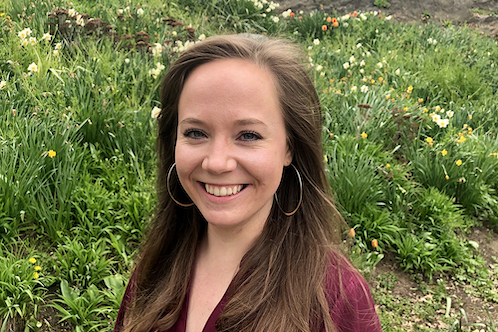In the 1980s, two American musicians left their homes and families to go play in the national symphony orchestra of Colombia. The musicians—one played the trombone, and one played the French horn—met in the brass section. They fell in love and then went on to raise a family and build careers in other professions in South America.
Thirty years later, Grace Pickens, their daughter, brings her experience growing up across cultures to her job at Vital Strategies as a Program Associate for the Partnership for Healthy Cities. Grace grew up in Colombia and Ecuador with her two older brothers, learning piano, drums and singing, ice skating and playing soccer. When her parents wanted to be closer to her brothers, who were attending college in the U.S., Grace moved with them to attend high school and college in North Carolina.
“When I was young, I thought I was Colombian, but then I grew up to know I am not Colombian or Ecuadorian. I am a third culture kid,” Grace said. “My parents planted roots where we were, and I am appreciative of being able to grow up connected to multiple cultures. My mom taught me English at home, and at school I learned in Spanish.”
By the time Grace was born, her parents had changed professions, training to became experts in linguistics and literacy development, as they were both skilled in languages. They had lived in indigenous communities in Colombia, which were then displaced by guerillas. In Pereira, where Grace grew up, people from these communities would visit and stay with her parents, as they all worked together to document the oral tradition of indigenous languages.
“Our home always had open doors,” Grace said. “There were people in and out of our house all the time. I grew up surrounded by multiple languages, and also with people who worked in service-oriented careers.”
Grace lived in Pereira, a smaller, coffee-growing city, until she was 8, and then in Quito, Ecuador until she was a teenager. She attended high school in a rural town outside of Charlotte, North Carolina and college at the University of North Carolina, Chapel Hill, where she knew she wanted to work to improve people’s lives in some way, but she was not sure yet how.
She thought she might want to be a nurse, so she volunteered in a hospital system throughout college. A favorite class was medical anthropology, sparking her interest in public health.
She graduated with a degree in Global Health and Environment and Hispanic Literatures and Culture and with a minor in Speech and Hearing Sciences.
Post-graduation, she thought she would become a speech-language pathologist, so she worked as a research assistant at a bilingualism and psycholinguistics lab at Northwestern University.
“I was working on a project doing coding and audio transcription that looked at the interaction styles between mother and child for Thai bilingual and monolingual communications. I really enjoyed it, but it highlighted that’s not what I wanted to do. I needed a broader perspective.”
Grace then earned a Fulbright Fellowship to go to Argentina, where she worked as an English teaching assistant in an English teacher training program and volunteered at a local nonprofit for nine months.
When she returned to the U.S., she worked at a small nonprofit called The Open Door, which ran volunteer-led English, computer and GED-prep classes for immigrants in New York. After working there for a year, Grace joined Vital Strategies in December 2019 as a program assistant for the Partnership for Healthy Cities and was promoted to program associate in January 2021. Half of her job is to provide general program support and half of her job is working with the 14 Latin American cities of the Partnership’s 76-city network.
“I always knew I wanted to be able to continue working in Spanish. And I have always wanted to work in a culturally diverse environment,” Grace said. “It feels like home to me to be in an environment where everyone is from all over.”
She is most proud of having led and supported logistics coordination for the COVID-19 response, and NCD webinars and smaller exchanges for cities—witnessing the network component of the Partnership in action. She is proud of how the program has supported cities in their focus on noncommunicable diseases, and how they rapidly expanded to COVID-19 response in 2020.
“Seeing the cities’ accomplishments in the last year has been incredible. Lima adopted a really big food policy promoting healthy food environments for children and adolescents through the banning of junk food advertisements in schools,” as well as restaurant requirements and a range of other new rules, she said. “While I wasn’t here to see all the groundwork that was laid, I have learned how much time it takes for policy implementation. I witnessed that one short time period and am proud of my peripheral support.”
She is excited that the new Policy Accelerator program through the Partnership will assist cities in creating and adopting policies as well as institutionalizing policy development processes so that change is more sustainable.
Grace worked at Vital’s New York office for only three months before the pandemic struck.
“I am a people person, and I thrive off of that energy,” she said. “It was a hard year, but I also had friends who got married, and a niece was born. And we did a lot of work,” she said. “What the cities are doing and we are supporting, cemented my desire to go on and get my MPH.” She is now applying to graduate programs in public health.
“What attracts me to global health is wanting a broader perspective. Public health takes a step back and looks at a bigger picture prevention-wise,” Grace said. “The health system has historically neglected and excluded many communities—and continues to do so—and being privy to that growing up, with my parents working with communities facing language loss due to displacement, is a big motivator.”
